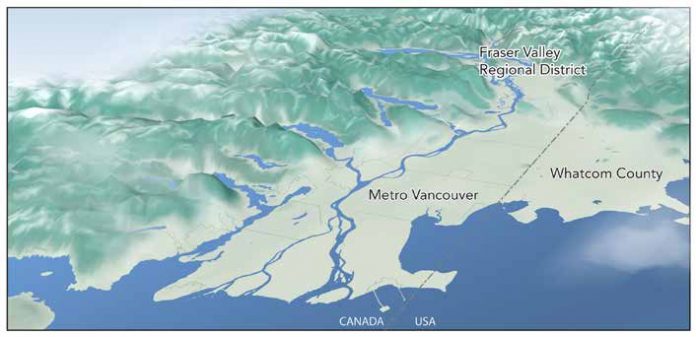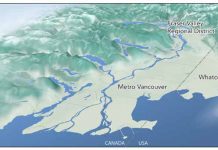METRO Vancouver is continuing an air quality advisory for Metro Vancouver and the Fraser Valley Regional District because of high concentrations of fine particulate matter and is issuing an additional advisory for ground-level ozone. Conditions are expected to persist through at least tomorrow. Wildfire smoke from fires in Washington and Oregon continues to impact the region’s fine particulate matter concentrations. Wednesday’s forecasted hot temperatures combined with wildfire smoke will cause elevated ground-level ozone concentrations.
Smoke concentrations may vary widely across the region as winds and temperatures change, and as wildfire behaviour changes.
Ground-level ozone is not emitted directly into the air. It is formed when nitrogen oxides (pollutants emitted when fuels are burned) and volatile organic compounds (emitted from solvents) react in the air in the presence of sunlight. The highest levels of ground-level ozone are generally observed between mid-afternoon and early evening on summer days.
Fine particulate matter, also known as PM2.5, refers to airborne solid or liquid droplets with a diameter of 2.5 micrometres (µm) or less. PM2.5 can easily penetrate indoors because of its small size.
Persons with chronic underlying medical conditions or acute infections such as COVID-19 should postpone or reduce outdoor physical activity until the advisory is lifted, especially if breathing feels uncomfortable. Exposure is particularly a concern for people with underlying conditions such as lung disease, heart disease, chronic obstructive pulmonary disease (COPD) including bronchitis and emphysema, as well as asthma, and/or diabetes, individuals with respiratory infections such as COVID-19, pregnant women and infants, children, outdoor workers (e.g. construction and agricultural workers), and older adults. Individuals who are socially marginalized may also be at elevated risk.
Metro Vancouver says that as we are in the summer season with warm temperatures, it is also important to stay cool and hydrated. Indoor spaces with HEPA air cleaner filtration and air conditioning may offer relief from both heat and air pollution, but physical distancing guidelines for COVID-19 should still be observed. Consider creating a comfortable space at home with a portable air conditioner (if you do not have central air conditioning). If you are experiencing symptoms such as chest discomfort, shortness of breath, coughing or wheezing, seek prompt medical attention. Call 9-1-1 in the case of an emergency.
Metro Vancouver works in cooperation with Environment and Climate Change Canada, Fraser Valley Regional District and B.C. Ministry of Environment and Climate Change Strategy to look after air quality.
Information about real-time air quality readings for Metro Vancouver and Fraser Valley communities and potential health impacts can be found at www.airmap.ca and http://www.env.gov.bc.ca/epd/bcairquality/readings/find-stations-map.html .
To sign up for air quality alerts in your area, go to: http://www.metrovancouver.org/services/air-quality/mailing-list











